
COVID-19 and its impact on healthcare in Europe
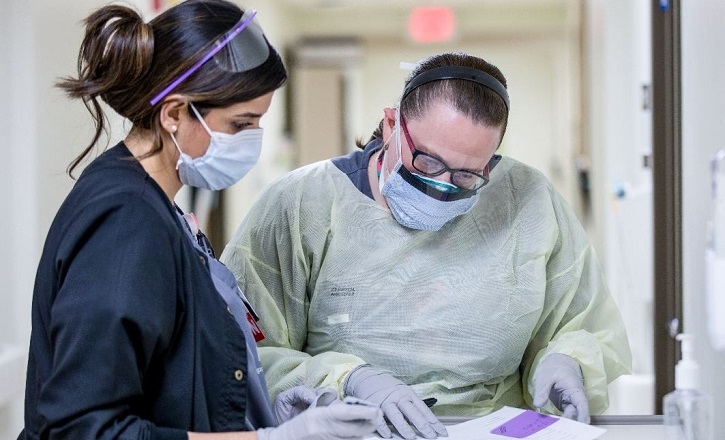
Nurses review medical charts (Photo Credit: Courtesy photo)
SEMBACH Kaserne, Germany – While the recent outbreak of COVID-19 has had a major impact on healthcare, Army medical facilities in Europe are working hard to continue providing quality health care and services to their beneficiaries.
As Regional Health Command Europe medical treatment facilities have had to adjust their operations to meet the increased demand for acute care and COVID-19 screening operations, patients can expect some changes to the availability of routine appointments. However, MTF staffs are working hard to meet the needs of beneficiaries across Europe.
WHAT CAN BENEFICIARIES EXPECT IN THE NEAR TERM?
“Generally speaking, primary care clinics are continuing to see patients,” said Ryan Lindgren, a health system specialist with Regional Health Command Europe.
“However, some non-urgent care has been deferred until after the COVID threat wanes. Acute care needs, on the other hand, are being addressed either in the clinic or as a virtual visit. Acute care appointments are for issues that need to be addressed in the next 24 hours,” Lindgren said.
“Additionally, visits that are very hands-on, such as hearing and eye exams, have been put on hold for protection of the patients and staff. Primary care will continue its current efforts as long as COVID remains a threat. RHCE has a very strong virtual health capability, so I expect it will continue even after the COVID threat subsides,” said Lindgren.
HOW CAN PATIENTS MAKE APPOINTMENTS OR OBTAIN ADVICE?
“Patients can still call the central appointment line for appointments,” Lindgren said. “However, some non-urgent requests may be deferred, as most appointment types are for acute issues needing to be seen in the next 24 hours.”
“We are, however, starting to open up some future appointments” added Lindgren. As a result, callers may expect more appointment availability in the coming weeks. Clinics are also now doing some of their own appointing to match the availability of providers with their patients’ needs. So, beneficiaries might be able to contact the clinic directly if they feel they need to be seen for an urgent matter.”
NEED MEDICAL ADVICE? CALL THE NURSE ADVICE LINE
TRICARE beneficiaries can call the Nurse Advice Line 24 hours a day / seven days a week for medical advice.
To learn more about the Nurse Advice Line visit: https://mhsnurseadviceline.com/home
Numbers for the Nurse Advice Line are as follows:
- Bahrain: 800-06432
- Spain: 900-82-2740
- Belgium: 0800-81933
- Turkey: 00-800-44-882-5287
- Germany: 0800-071-3516
- UK: 0800-028-3263
- Italy: 800-979721
With a larger than normal volume of phone calls, some users have experience difficulty calling the appointment line or reaching the Nurse Advice Line.
“We began working with the clinics across the footprint to change appointment lines to 24 hours, opening access for the Nurse Advice Line and those patients needing acute care,” said Lindgren. “Other efforts have included the increase of telephone lines region-wide from 60 lines to 150 lines to allow more virtual house calls, and improve phone access to the clinics.”
COMMUNICATE WITH YOUR PROVIDER VIA SECURE MESSAGING
Other than face-to-face communication, another way beneficiaries can communicate with their provider is through the use of TRICARE Online Secure Messaging. Secure Messaging lets you talk privately with your doctor or the medical staff via secure email. With Secure Messaging, you can:
- Ask questions and get non-emergency health care advice
- Request appointments and referrals
- Ask your doctor to renew your prescriptions
- Request copies of labs and other test results
- Find health education information about a variety of topics including links to doctor-recommended information and sites
To learn more about TOL Secure Messaging visit: https://go.usa.gov/xvB8t
ARE LAB SERVICES BEING OFFERED?
Lt. Col. Jared Andrews, Laboratory Director at Landstuhl Regional Medical Center, said, “All laboratory services remain the same and we continue to do specimen draws. However, individuals who have COVID-19 symptoms must first go to the COVID clinic to be screened prior to entering the hospital. If they have symptoms they must wear a mask. We require all persons in the specimen collection area to wear a mask or face covering.”
HOW CAN I GET MY PRESCRIPTIONS REFILLED?
Overall, there has been little change in pharmacy operations, according to Lt. Col. Paul Kassebaum, chief of pharmacy for Landstuhl Regional Medical Center.
“With so many things in flux, our goal has been to sustain access to medications and keep processes simple,” Kassebaum said. “However, if filling a prescription can be safely delayed, that is most desirable. Doing so will allow people to continue to shelter in place at home and not make trips out into public spaces.”
“For refill prescriptions, we strongly urge patients to request them ahead of time through TRICARE Online or over the phone,” Kassebaum said. “By doing this, the prescriptions will already be filled when the patient arrives, thus limiting the patient’s time in the pharmacy lobby. We will, of course, accept refill requests at the pharmacy window, but that increases the time waiting in the lobby, potentially increasing the risk to themselves and others.”
Some military treatment facilities in Europe have implemented drive-thru pharmacy services and other protective measures.
“To increase patient safety and the safety of our staff, all of our outpatient pharmacies have installed Plexiglas in the pharmacy windows,” Kassebaum said. “When visiting the pharmacy, we ask that patients use hand sanitizer before and after pulling a ticket from the kiosk. It should also be noted that our pharmacy staff no longer handle or touch patient ID cards. And, as with any other public space, we recommend that patients wear cloth masks when visiting the pharmacy.”
WHAT ABOUT DENTAL SERVICES?
Col. Manuel Pozo-Alonso, commander of Dental Health Command Europe said, “The recent COVID-19 outbreak across Europe resulted in the curtailment of most non-emergency dental care in Army dental clinics. Army dental clinics are currently only seeing urgent or emergency type dental patients. Routine appointments will need to be rescheduled at a later date.”
Pozo-Alonso added, “However, if you feel you have a real dental emergency, or are in severe pain, call your local Army dental clinic so a dental provider can get a clear picture of your particular situation. If the dental provider establishes the need for treatment, you will be scheduled for an appointment to have your dental emergency addressed.”
ARE BEHAVIORAL HEALTH SERVICES STILL BEING PROVIDED?
One of the most significant changes to behavioral health services in Europe recently has been the expanded use of virtual appointments.
“Roughly 90 percent of the regular behavioral health appointments the past two or three weeks have been conducted virtually through videoconference or via telephone,” said Lt. Col. Emile K. Wijnans, director of Psychological Health for Regional Health Command Europe. “Most beneficiaries say they like and appreciate the services, even if it is an adjustment. The scope and general success of these virtual services may have lasting and significant consequences for future behavioral health care across EUCOM and adjacent combatant commands.”
DO I HAVE TO WEAR A FACE MASK OR COVERING?
One of the most visible changes beneficiaries will notice is the new requirement to wear a facial covering. The use of a cloth face covering is now required at all Regional Health Command Europe medical and dental facilities by both staff and patients/visitors over the age of five.
The U.S. Centers for Disease Control and Prevention (CDC) recommends wearing cloth face coverings in public settings where physical distancing measures are difficult to maintain. Additional guidance has been provided to staff who have regular close contact (less than six feet) with patients with known COVID-19 exposure, or who are symptomatic.
The Department of Defense has implemented guidance on the use of cloth face coverings, including wear of the neck gaiter and other cloth items, such as bandanas and scarves, as face coverings.
For more ideas on making a cloth face covering, visit the CDC website: http://ow.ly/eIBG50z9N4S.
Mobile app may offer hope in times of distress
Article
4/16/2020
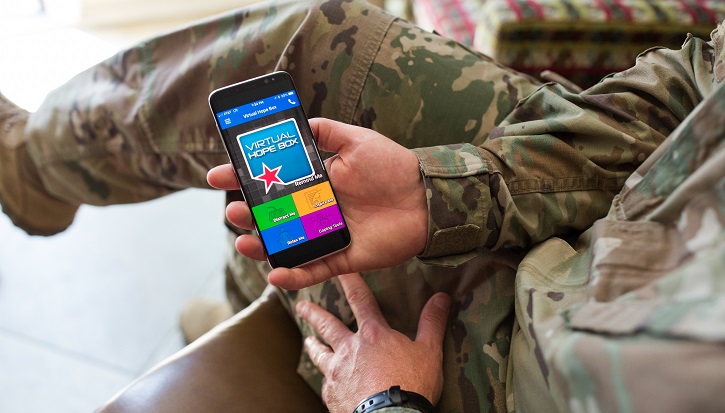
Virtual Hope Box is one mobile app solution that may help individuals cope
Uniformed Services University Adds COVID 19 Training to Curriculum
Article
4/16/2020
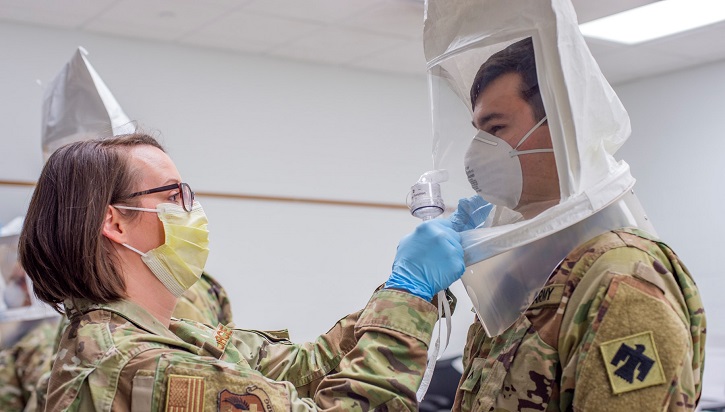
All of the university’s medical school Class of 2020 students completed the training prior to graduating, and the rest of the medical students have until April 15 to finish.
Memorandum on Providing Federal Support for Governors' Use of the National Guard to Respond to COVID-19
Publication
4/14/2020
Benefits Eligibility for 32 USC 502(f) Missions
Publication
4/14/2020
A chart outlining the various Benefits Eligibility for 32 USC 502(f) Missions
Implementation Guidance for Presidential Memorandum, "Providing Federal Support for Governor's Use of the National Guard to Respond to COVID-19 ," Dated April 7, 2020
Publication
4/14/2020
DoD COVID-19 Practice Management Guide Version 2
Technical Document
4/14/2020
This COVID-19 Practice Management Guide has been rapidly and thoughtfully developed by a multi-specialty group of 60 subject matter experts from across the Department of Defense Military Health System. The intent of this publication is to provide clinicians and military medical treatment facilities (MTFs) with best practices based on latest evidence to optimize DoD response to the current COVID-19 pandemic. This Practice Management Guideline consolidates resources and optimizes the management of patients requiring clinical care during the global COVID-19 pandemic.
Military medical training continues during COVID-19
Article
4/14/2020
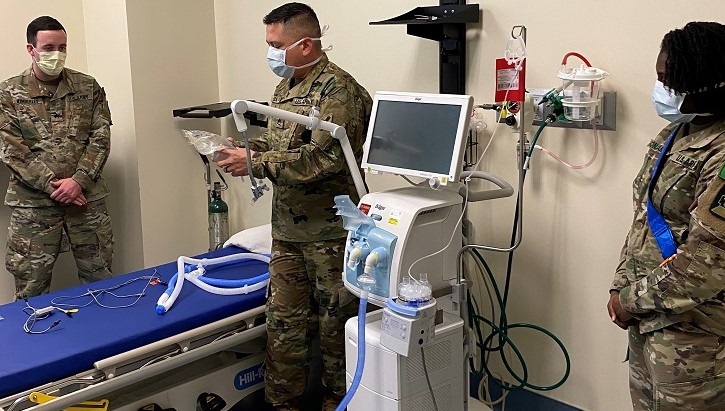
METC’s mission - to train the world's finest medics, corpsmen and technicians - is vital to force readiness and the nation.
Military hospital dials in virtual healthcare to combat COVID-19
Article
4/13/2020
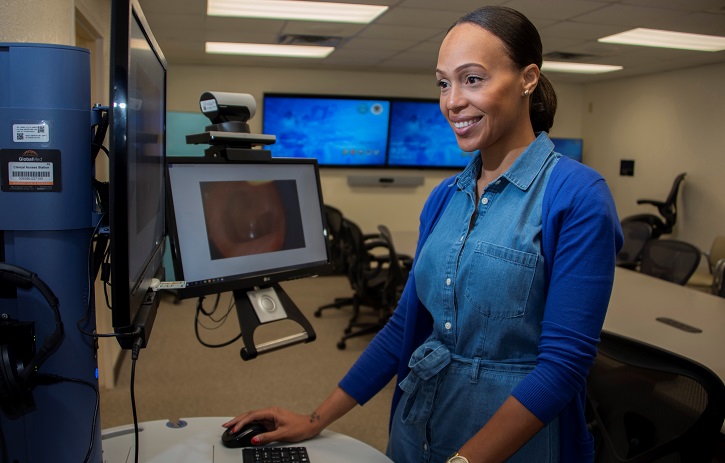
At BAMC, traditional face-to-face appointments for most routine care have increasingly shifted to virtual care to ensure social distancing as well as patient and provider safety.
Stay Home Slide Show
Video
4/10/2020
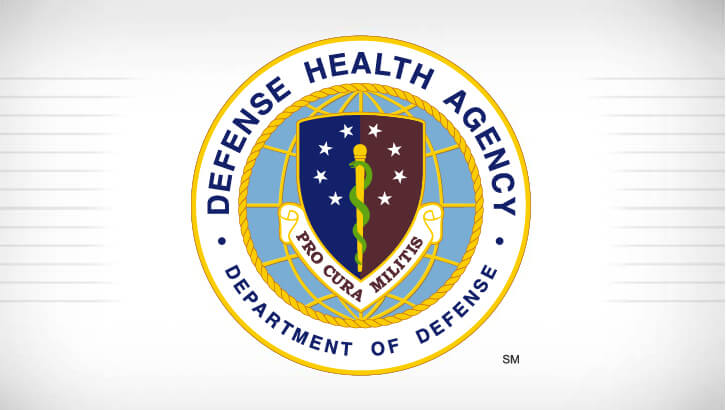
Slide show of photos from BAMC's #stayhome campaign
inTransition Teams Up with the Veterans Crisis Line to Support Service Members in Crisis
Article
4/10/2020
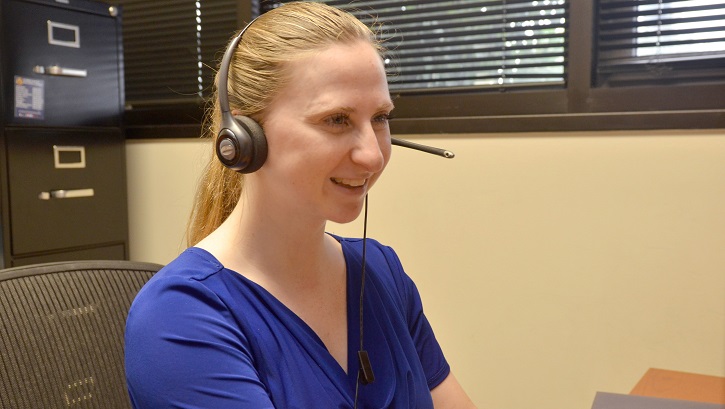
In response to an increased volume of calls to the Veterans Crisis Line (VCL) since the outbreak of the novel coronavirus (COVID-19), inTransition is partnering with the VCL to coordinate certain types of care for active duty service members.
Army Corps Launches Alternate Care Facility Construction
Article
4/10/2020
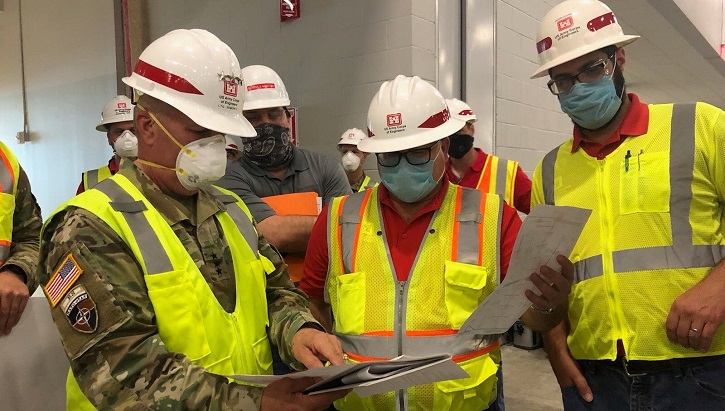
Building health care facilities isn’t a new task for USACE, which has years of experience designing and building hospitals and clinics for the military health system.
Guardsmen Remain Adaptable in Face of Coronavirus
Article
4/9/2020
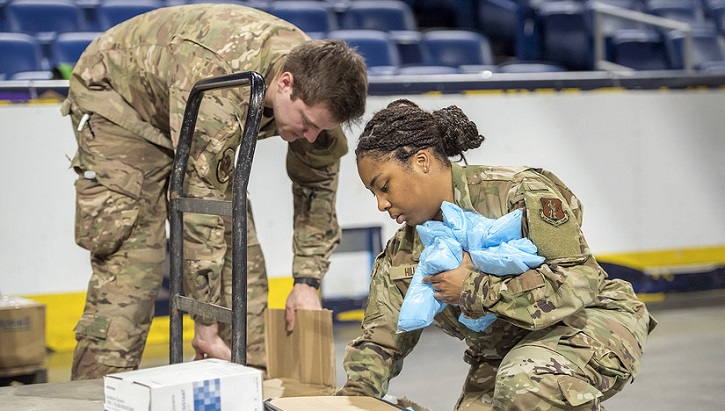
More than 28,000 National Guardsmen are helping to fight the coronavirus across America
Authorization to Employ Military Medical Capabilities to Treat COVID-19 Patients
Publication
4/8/2020
Effective immediately, the Commander, U.S Northern Command, is authorized, as he deems necessary and appropriate, to employ military medical capabilities under his operational control to treat patients who have contracted coronavirus disease 2019 (COVID-19).
Defense Health Official Urges Personnel, Families to Wear Face Masks
Article
4/8/2020
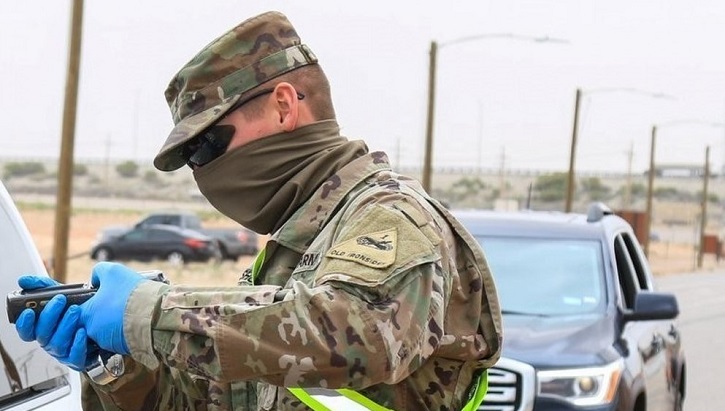
The face-covering mask can be fashioned from simple household items.
Talking to children about COVID-19 helps them feel safe and secure
Article
4/8/2020
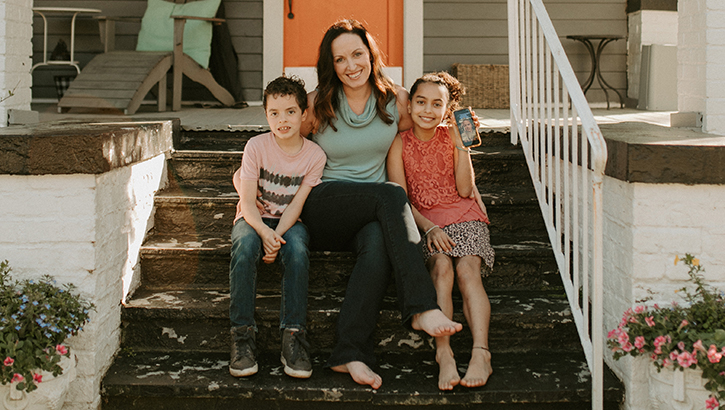
USU expert advises tailoring messages for different age groups





















.png)












No hay comentarios:
Publicar un comentario